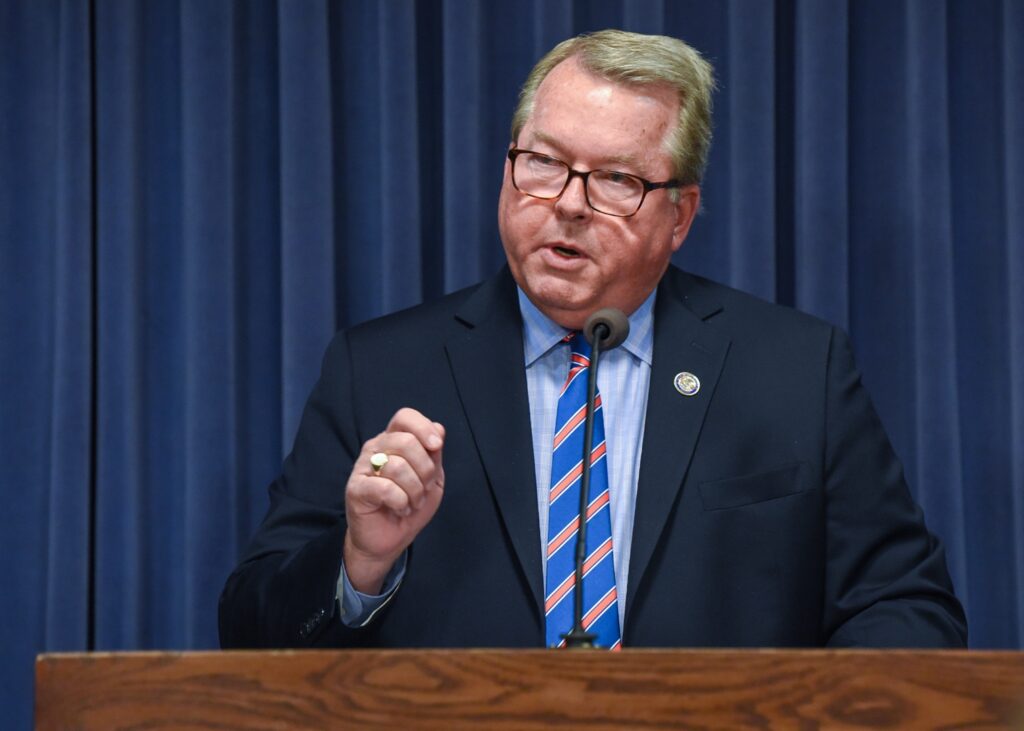
As Illinois’ unfriendly business climate has pushed large companies to leave the state or significantly reduce their corporate presence, members of the Senate Republican Caucus shared a package of business advocacy initiatives to help Illinois better compete, create jobs, and boost its economy.
“Illinois is rich with potential, an educated workforce, and a long history of innovation,” said Senate Republican Leader John Curran (R-Downers Grover). “Unfortunately, in 2021, in response to the defeat of the Progressive Income Tax Amendment, the Governor and the Democratic Majority passed a series of tax increases on Illinois businesses that continue to hold our job creators and job seekers back. Today we are here to advocate for policy solutions to help Illinois attract and retain businesses and investment in our communities.”
Leader Curran discussed Senate Bill 1810, which removes the $100,000 cap on the Net Operating Loss deductions on December 31, to help businesses invest and grow their organizations without revenue loss to the state.
Senator Win Stoller (R-Peoria), a business owner himself, introduced Senate Bill 1406 that makes good on the repeal of the franchise tax that the Governor and Democratic Majority stopped in 2021. The franchise tax includes three different taxes on money used to build a business as opposed to revenue or even net worth. Illinois is in the minority of states that impose such a tax.
“Our focus must be on enacting policies that attract and keep businesses in Illinois rather than discourage growth,” said Stoller. “Getting rid of the franchise tax removes a barrier that punishes employers for building their businesses in Illinois.”
Another measure that aims to attract and retain businesses in Illinois is Senate Bill 2140, proposed by Senator Andrew Chesney (R-Freeport), which would reduce the filing fee for limited liability corporations by 50 percent. Chesney also cosponsored Senate Bill 140 that eliminates the Estate Tax for persons dying on or after the effective date, or for transfers made on or after the effective date.
“Illinois can and must do more to let businesses know that we value them and appreciate their decisions to locate and operate in the State of Illinois. Unfortunately, the policies coming out of Springfield convey just the opposite. We make our business owners jump through an inordinate number of hoops and we wrap them up in red tape,” said Chesney. “Rather than stifling the state’s job creators, let’s help them grow.”
The goal of Senate Bill 2075, proposed by Senator Seth Lewis (R-Bartlett), is to support and retain the state’s legacy businesses. Lewis’ legislation would create a legacy tax credit for companies headquartered in Illinois, along with employee tax credits.
“We all live here because we either love Illinois, believe in its potential, or both. Our state has so much to offer. It is located in the heart of the nation, and it is a major transportation hub with state-of-the-art institutions and an educated citizenry that wants to work in a rewarding career. There is no reason why we cannot be a leader in the Midwest and nation for job creation and stability,” said Lewis. “This bill is one example of how we can make Illinois a place where people want to live, not leave.”
Senator Don DeWitte (R-St. Charles) has introduced several pieces of legislation poised to support job creators and spur innovation. His bills include Senate Bill 163, a tax credit to fund research and development, and Senate Bill 2084, which creates the Illinois Innovation Tax Credit.
“Rather than putting laws in place that push our job creators to take their business and jobs to other, more business-friendly states, we need to support them. We don’t just want businesses to locate in Illinois; we should incentivize them to grow and thrive here,” said DeWitte. “By unleashing the entrepreneurial spirit through R & D tax credits, we are encouraging individuals and corporations with great ideas to act, launch, and expand businesses right here in Illinois.”

